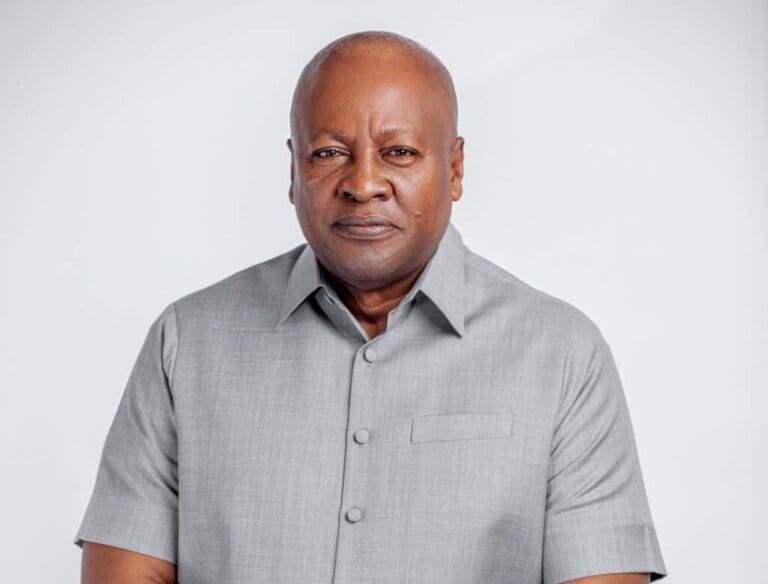Ghana’s economy has been struggling despite the discovery of oil and the reputation of the country from being the world’s second biggest cocoa producer behind neighbour Ivory Coast.
The over six million Ghanaians who voted for the second coming of former president John Dramani Mahama are expecting his incoming administration to tackle some if not all of the country’s current economic woes epitomised by a currency losing its exchange value at the minute, runaway inflation, fiscal indiscipline and entrenched corruption.
After suffering two poll defeats in 2016 and 2020 to retiring President Nana Akufo-Addo, Mahama ran a spirited campaign and pulled off an emphatic return to the presidency with 56.6% of the votes over vice-president Dr Mahamadu Bawumia’s 41.6%.
The voters who gave him the biggest margin of victory for a presidential candidate in Ghana since 2000 expect a lot from the man who had promised them everything during his campaign except turning water into wine.
His political magic wand should carry something of a Midas touch, which should change the country’s fortune.
During his campaign which began almost two years ago when he held regular meetings which were covered by the local media including private television stations, the 65-year old had vowed to institute measures which would breathe new life into Ghana’s sluggish economy.
In his victory speech, Mahama reiterated his campaign message of hope for millions of Ghanaians who yearn for a country on a progressive path to economic transformation which brings tangible improvements in their lives.
”The best days for Ghana are ahead of us” the former MP and teacher said while making it clear that he was under no illusions that the country faces some challenges which would require some serious work to overcome.
He made reference to his signature plan to turn Ghana into a 24-hour economic machine.
”This mandate represents many things to all its actors… It shows that the Ghanaian people have little tolerance for bad governance, particularly of the sort witnessed in the last eight years and that they are willing to take decisive action at critical moments when it matters most” he said.
“This mandate also serves as a constant reminder of what fate awaits us if we fail to meet the aspirations of our people and govern with arrogance. There is much to do to salvage our country and reset it. it would have to start with a reset of the relationship between citizens and elected officials” he added.
“We must channel our anger into resetting and rebuilding our nation” he said.
As Mahama basks in his victory, voters think his should be the shortest post-electoral honeymoon for the winner and insist that serious work to address Ghana’s myriad challenges could not come soon enough.
As the new president prepares to take over, Ghanaians expect that the economy would be his first priority.
The charts for Ghana’s economy have not made cheerful reading in the past few years despite being an oil-rich cocoa producer.
According to the African Development Bank’s outlook on Ghana, GDP growth decelerated from 3.8% in 2022 to 2.9% in 2023, although this was blamed on Russia’s war on Ukraine, and the residual effects of COVID-19.
Although local industries had inspired some growth during this period, inflation had persisted, worsening from 31.5% in 2022 to 40.3% in 2023.
This was caused mainly by food prices and currency depreciation, the AfDB indicated.
The Ghana Statistical Service (GSS) earlier this week announced that year-on-year inflation rose to 23.0 percent in November from 22.1 percent in October, 2024.
Chief Statistician, Professor Samuel K. Annim said the increase represented 0.9 percentage points in the rate of inflation and that on month-on-month, the rate of inflation increased to 2.6 per cent in November from 0.9 percent in October.
The rate of inflation in November was the highest since June when it stood at 22.8 percent.
The inflation in the price of food items which rose to 25.9 percent in November from 22.8 percent drove both the year-on-year and month-on-month.
This instability means that vegetables, tubers and plantains witnessed a price change of 40.0 percent which drove food inflation in November.
Tackling the cost-of-living crisis
In the run up to the December 7th elections, ordinary Ghanaians have complained that they are unable to keep up with the rising cost of living with rising cost of consumer items. This followed a steady drop in the value of the Cedi against international currencies. Many of them voted for Mahama expecting him to act on his election promise to deliver them from the runaway inflationary prices on the food markets.
While the words from his victory speech would resonate with the ordinary market women, street vendors, bankers, teachers, security personnel, nurses, doctors, pastors, drivers and tailors who he described as essential to the functioning of the country, Ghanaians would judge his performance based on the economy and how much his return at the helm has improved their purchasing power in the next four years.
WN/as/APA


